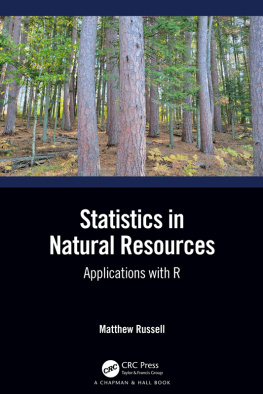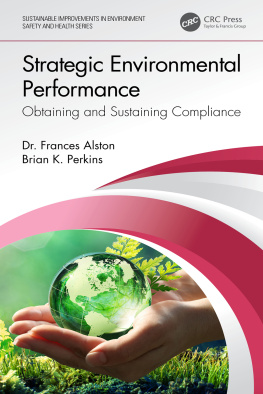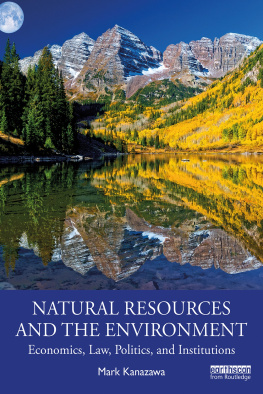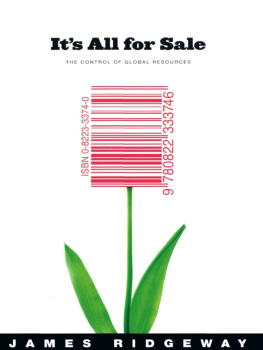
Sustaining Natural Resources in a Changing Environment
Climate change and environmental degradation have intensified the pressures on crucial resources such as food and water security and air quality. In this collection, academic researchers and practitioners who have lived and worked in countries as geographically and culturally diverse as Brazil, China, India, Ghana, Palestine, Uganda and Venezuela draw on their wide-ranging international and inter-sectoral experience to offer valuable comparative insights into the relationship between research and evidence-based policy for sustaining natural resources. Their contributions provide a novel mix of disciplinary perspectives ranging across geography, ecology, social policy, the political economy, philosophy, international development, engineering technology, architecture and urban planning. They examine the institutions involved in generating and mediating evidence about the sustainability of natural resources in a changing environment, and the different methodologies employed in collecting and assessing evidence, informing policy and contributing to governance. The authors demonstrate not only that social science evidence on governance and policy implementation to sustain natural resources must complement natural science inputs, but also that local communities must be an integral part of any programme development.
This book was originally published as a special issue of Contemporary Social Science.
Linda Hantrais, FAcSS, is Emeritus Professor of European Social Policy at Loughborough University, UK, and Visiting Professor at the LSE Centre for International Studies, UK. Her research interests span international comparative research theory, methods, management and practice, with particular reference to public policy and institutional structures, and the relationship between socio-demographic trends and social policy.
Ruth Kattumuri, FAcSS, is Co-Director of the LSE India Observatory and an Associate at the Grantham Research Institute on Climate Change and the Environment, UK. She is involved in transdisciplinary evidence-based research, policy influence and advice concerning sustainable growth, inclusion and population development, primarily in the context of the Global South.
Ashley Thomas Lenihan is a Visiting Fellow at the LSE Centre for International Studies, UK, and a Term Member of the Council on Foreign Relations, USA. Her research focusses on the connection between state power and foreign investment, and the relationship between social science research and the policymaking process.
Sustaining Natural Resources in a Changing Environment
Edited by
Linda Hantrais, Ruth Kattumuri and Ashley Thomas Lenihan
First published 2019
by Routledge
2 Park Square, Milton Park, Abingdon, Oxon, OX14 4RN, UK
and by Routledge
52 Vanderbilt Avenue, New York, NY 10017, USA
Routledge is an imprint of the Taylor & Francis Group, an informa business
Chapters 1-8 2019 Academy of Social Sciences
Chapter 9 2017 Ed Brown, Ben Campbell, Jon Cloke, Long Seng To,
Britta Turner and Alistair Wray. Originally published Open Access.
All rights reserved. With the exception of Chapter 9, no part of this book may be reprinted or reproduced or utilised in any form or by any electronic, mechanical, or other means, now known or hereafter invented, including photocopying and recording, or in any information storage or retrieval system, without permission in writing from the publishers. For copyright information about Chapter 9, please see the chapters Open Access footnote.
Trademark notice: Product or corporate names may be trademarks or registered trademarks, and are used only for identification and explanation without intent to infringe.
British Library Cataloguing in Publication Data
A catalogue record for this book is available from the British Library
ISBN 13: 978-1-138-36170-6
Typeset in Myriad Pro
by RefineCatch Limited, Bungay, Suffolk
Publishers Note
The publisher accepts responsibility for any inconsistencies that may have arisen during the conversion of this book from journal articles to book chapters, namely the possible inclusion of journal terminology.
Disclaimer
Every effort has been made to contact copyright holders for their permission to reprint material in this book. The publishers would be grateful to hear from any copyright holder who is not here acknowledged and will undertake to rectify any errors or omissions in future editions of this book.
Contents
Ruth Kattumuri
Kevin Sansom, David Hirst and Sam Kayaga
Raman Srikanth and Hippu Salk Kristle Nathan
Huiming Zong and Bingjie Cai
Nelson Oppong
Satyapriya Rout
Nicole Kenton and Sumita Singha
Kathryn Hochstetler
Ed Brown, Ben Campbell, Jon Cloke, Long Seng To, Britta Turner and Alistair Wray
The chapters in this book were originally published in Contemporary Social Science, volume 13, issue 1 (March 2018). When citing this material, please use the original page numbering for each article, as follows:
Chapter 1
Sustaining natural resources in a changing environment: evidence, policy and impact
Ruth Kattumuri
Contemporary Social Science, volume 13, issue 1 (March 2018), pp. 116
Chapter 2
International water targets and national realities in Sub-Saharan Africa: the case of Uganda
Kevin Sansom, David Hirst and Sam Kayaga
Contemporary Social Science, volume 13, issue 1 (March 2018), pp. 1729
Chapter 3
Towards sustainable development:planning surface coal mine closures in India
Raman Srikanth and Hippu Salk Kristle Nathan
Contemporary Social Science, volume 13, issue 1 (March 2018), pp. 3043
Chapter 4
The impact of urbanisation on land resources in Chongqing, China, 19972015
Huiming Zong and Bingjie Cai
Contemporary Social Science, volume 13, issue 1 (March 2018), pp. 4457
Chapter 5
Negotiating transparency: NGOs and contentious politics of the Extractive Industries Transparency Initiative in Ghana
Nelson Oppong
Contemporary Social Science, volume 13, issue 1 (March 2018), pp. 5871
Chapter 6
Gendered participation in community forest governance in India
Satyapriya Rout
Contemporary Social Science, volume 13, issue 1 (March 2018), pp. 7284
Chapter 7
Community empowerment in changing environments: creating value through food security
Nicole Kenton and Sumita Singha
Contemporary Social Science, volume 13, issue 1 (March 2018), pp. 8599
Chapter 8
Environmental impact assessment: evidence-based policymaking in Brazil
Kathryn Hochstetler
Contemporary Social Science, volume 13, issue 1 (March 2018), pp. 100111
Chapter 9
Low carbon energy and international development: from research impact to policymaking








